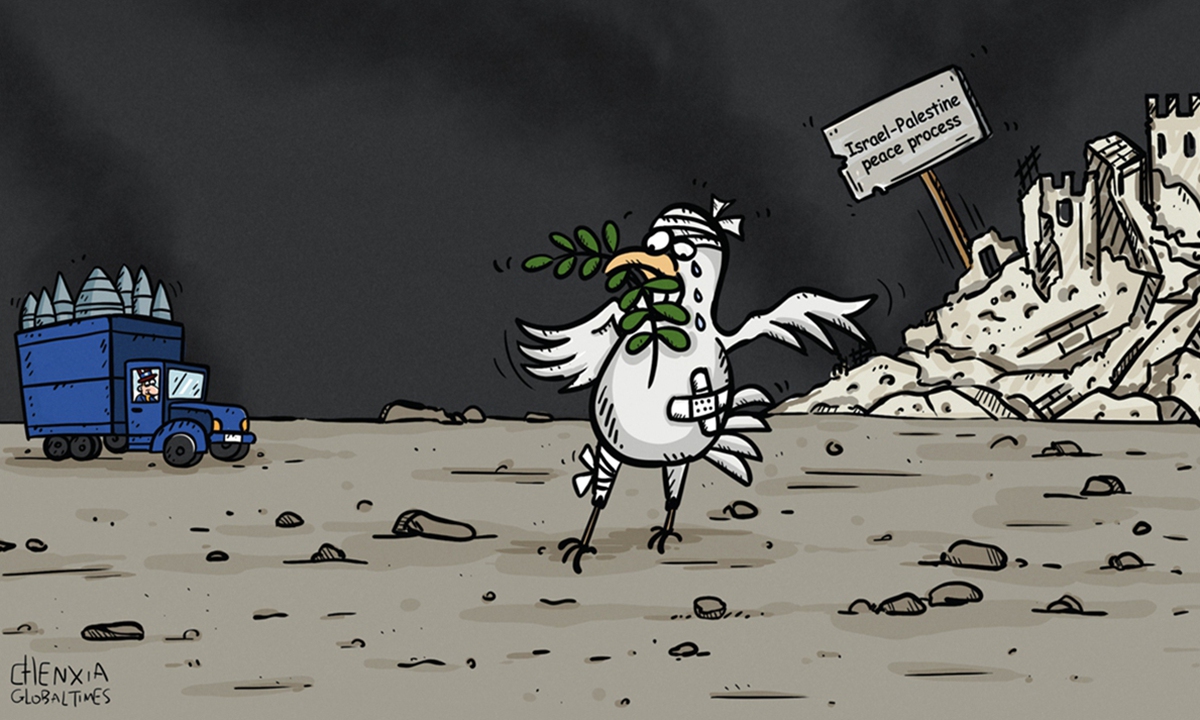
Illustration: Chen Xia/GT
The Palestinian question has spent long periods hidden from view, the plight of the Palestinians forgotten and ignored, only intermittently forcing its way back on the agenda. Once more, the huge historic grievance felt by Palestinians has erupted, dominating the Middle East, and demanding the attention of the world. To reduce the causes of the present conflict to the action of Hamas on October 7 is entirely to miss the point. The Palestinian question will not go away until the fundamental issue of a Palestinian state is addressed.The roots of the problem lie in the defeat of the Palestinians in the 1948 war and the resulting displacement of the Palestinian population. Those Palestinians who continued to live in Israel were reduced to second-class status in an apartheid-style state. There are two reasons why this historic injustice has survived for more than 70 years. First, Israel has refused to accept a two-state solution. It believes in a Jewish state and nothing for the Palestinians. And for many decades Israel has pursued a highly aggressive approach toward its Arab neighbours, most notably with the expansion of Israeli territory after the 1967 war. The second reason is that Israel has received unconditional support from the US ever since its establishment. Israel survives - economically, politically, and militarily - on a life-support system provided by the US. Israel enjoys a closer relationship with the US than even the latter's traditional allies like the UK, Australia, and Japan.
Israel is, in large measure, a Western creation and a Western dependency. This is also the source of its historic vulnerability. What happens when the US is no longer able to underwrite Israel in the manner that it has previously. Its support for Israel's morally reprehensible bombing of Gaza has resulted in America's humiliation in the United Nations General Assembly, with 120 countries supporting a sustained humanitarian pause, only 14 countries voting against (six of which were Pacific Islands), and 45 abstentions, including the UK and Japan. For a country that still purports to be the global leader, the US ended up embarrassingly isolated on a huge international question. This is also part of a longer-run process: the US no longer enjoys anything like the same influence in the Middle East that it enjoyed a decade ago, let alone before. And this declining authority will surely continue.
With America weakening, Israel must learn to live harmoniously with its Arab neighbours. Above all, this requires a settlement of the Palestinian question. All the evidence, however, suggests that Israel is hell bent on moving in the opposite direction. The Israeli government's stated objective is the destruction of Hamas. It will not happen. On the contrary, its indiscriminate bombing of Gaza will only alienate the population even more and serve in future to greatly strengthen support for Hamas. The Israeli government operate under the illusion that Hamas is a repressive force that enjoys zero popular support. This is patently untrue as shown, not least, by opinion polls. From the IRA in Northern Ireland and the Vietcong in South Vietnam, from Mau Mau in Kenya to the Taliban in Afghanistan, this is not a new phenomenon: oppressed people, dispossessed and without any political power, seek whatever means they can to oppose repressive regimes. Hamas is but the latest example. Sooner or later, the Israeli government will have to negotiate with Hamas, as well as the Palestinian Authority, in order to find a way of addressing the Palestinian question.
The war in Gaza, like the ongoing war in Ukraine, is a reminder of the instability that now characterises the global order. There are manifold reasons, but the most important single factor is the decline of the US and the consequent weakening, even unravelling, of the global order. We can expect this situation to continue, and, no doubt, intensify. The dangers are clear for all to see. It calls for cool heads, dialogue rather than acrimony, and restraint rather than belligerence. China is deeply aware of this. It has been a singular feature of its diplomacy in 2023 during which China has increasingly emerged as not just a global leader but increasingly the key global leader. There is no better example than the Middle East where China has become a conciliator, for example between Saudi Arabia and Iran, and a voice for peace and dialogue. A Muslim voice and presence has become a marked feature of the expansion of BRICS and the widening role of Belt and Road. It is a lesson that the West could learn from. Long sensitive to and aware of the importance of the Palestinian question, China can play over time a crucial role in encouraging a much-needed peace process.
The author is a visiting professor at the Institute of Modern International Relations at Tsinghua University and a senior fellow at the China Institute, Fudan University. Follow him on X @martjacques. opinion@globaltimes.com.cn




